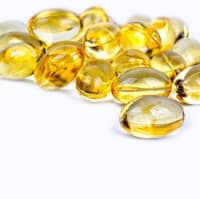Vitamin D is a group of fat-soluble secosteroids responsible for increasing intestinal absorption of calcium, magnesium, and phosphate, and many other biological effects. In humans, the most important compounds in this group are vitamin D3 (also known as cholecalciferol) and vitamin D2 (ergocalciferol).
The major natural source of vitamin D is synthesis of cholecalciferol in the lower layers of epidermis of the skin through a chemical reaction that is dependent on sun exposure (specifically UVB radiation). Cholecalciferol and ergocalciferol can be ingested from diet and supplements. Mushrooms exposed to ultraviolet light contribute useful amounts of vitamin D.
Vitamin D can be considered a hormone, with activation of the vitamin D pro-hormone resulting in the active form, calcitriol, which then produces effects via a nuclear receptor in multiple locations.
Healing Properties
Antiinflammatory
Vitamin D enables anti-inflammation to promote tissue repair in response to injury.[1]
Anticancerous
Vitamin D supplementation reduces risk of cancer death by 16%[2]
Vitamin D supplementation reduced the risk of cancer death by 16%. A total of 75,454 participants were identified. Vitamin D supplementation statistically significantly reduced the risk of cancer death. In subgroup analyses, all cause mortality was significantly lower in trials with vitamin D3 supplementation than in trials with vitamin D2 supplementation.[2:1]
Skin Health
Photoprotective
Vitamin D protects the skin from UV damage by promoting macrophage autophagy (natural, orderly degradation and recycling of cellular components).[1:1]
UV Radiation Protection
Oral administration of high doses of Vitamin D3:
- Reduced skin erythema and thickness.
- Increased expression of skin barrier genes, which help to repair the epidermal barrier and attenuate the inflammatory insult.[1:2]
